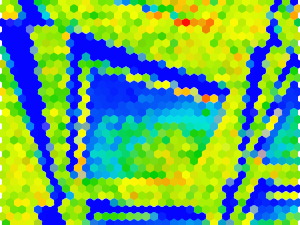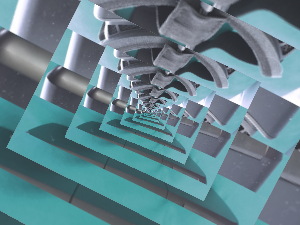Sound: Advanced Topics II


This will be an ... interesting semester. We have purchased a range of interactive technological devices for use at the CMC, and it occurred to us that perhaps we should explore their characteristics in a class. So, this is it! The TRULY FUN part of all this is that neither Alec nor I have done much with these devices ourselves. This will be a real learning-by-doing class. I expect that some of it will go very well, some of it will be ok, and sometimes the class will be a total disaster. It's kind of like the three bears of computer music pedagogy. At least you can't say we did not warn you!
I'm looking forward to exploring these tools, though. We won't be getting into any seriously-heavy coding in the class, although we will be hitting Max/MSP a lot because most of the extant capabilities for the snazzy interfaces are addressible from within that environment. Of course, I'll also throw in a bit of RTcmix via the rtcmix~ object as well as using some javascript (available inside Max/MSP) to handle the more text-based, procedural and data-structured tasks. But not to worry if you are a programming neophyte! We'll be providing many examples of things to do, and our hope is that you can easily adapt them for your own nefarious purposes. Don't be bashful about contacting either Alec or me if you are having difficulty with the class.
So what are these wondrous devices? Over the course of the semester, we plan to take a look at these:
You are also welcome to use other programming environments (like
pd
for example), but we'll be working within the framework mentioned above.
To be honest, unlocking some of the deeper features of these devices
requires the use of more extensive SDKs (such as
OpenFrameworks
or
Xcode/iOS Developer Tools),
but that means more intensive programming than we will be doing.
Collected here are links to software that we may be using in class:
For our guest speakers, watch for announcements on the syllabus.
We may need to rearrange the classes as the term unfolds to accommodate
these guests. Plus if we're getting totally behind, then we'll
modify the schedule accordingly.
If you prefer to work on your own computer, that's perfectly fine. You may temporarily take some of the devices from room 324 to work with them on your own machine, but they have to remain at the CMC and you will be required to return them to room 324 when you are finished using them.
You may sign up studios and machines for doing your work at the CMC using our on-line signup system. If you are having trouble getting access to the hardware or software you need, please let us know. The CMC is intentionally in a state of perpetual flux, reflecting the rapid evolution of the field of computer music. Our primary guide for the kinds of hardware and software investments we need to make comes from you, our happy students!
Do let us know if you are having problems getting equipment or
software to work for you. This promises to be a more intense term
because of the range of material we will be discussing.
In general, if you are having difficulty
understanding the programming paradigms
we are using or the applications and information we are covering.
be sure to talk to us. We'll be happy to sit down and work through
any issues with you.
Each week we do will become a link to information relating to that
class. We'll try to keep up with linking in class patches, examples
and information, but we may fall behind. Yell at us when we do.
It's always a good idea to make an appointment to see me, even during my purported office hours, because I often have to run around campus like a maniac doing strange, computer-music stuff. If you need to contact someone at the CMC or Music Department using your actual voice, the relevant phone numbers are:
I say this every year, and generally people believe it (I think): by this point in your career the last thing you should be worrying about is a grade. The main thing is to find something that you'd really like to do and then do it. Please don't try to impress us with your consummate knowledge and skill, we are more impressed by people who do things. Honest!
Hope you enjoy the class!
